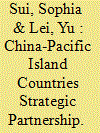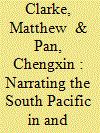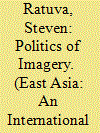|
|
|
Sort Order |
|
|
|
Items / Page
|
|
|
|
|
|
|
| Srl | Item |
| 1 |
ID:
186118


|
|
|
|
|
| Summary/Abstract |
China’s vigorous involvement in the Pacific Island countries (PICs) is often surmised by scholars of international relations (Wesley-Smith 1; Pryke 2) to be primarily motivated by geopolitical calculations. This paper argues that China’s increasing presence in the Pacific Islands indeed helps China create a “sphere of influence,” but such geopolitical dynamics are characterized not merely by China’s response to its perceived containment imposed by the USA and its allies in the region, but also by China’s willingness to engage with PICs on its own terms. This is reflected in China’s multifaceted approaches to offering economic assistance and expanding its economic and political presence in the region. China has increasingly cemented its strategic partnership with PICs by pursuing its traditional strategy of “non-interference” that satisfies PICs’ demands for political independence and self-determination. China reaps not only economic but also geopolitical benefits from its intensified economic, and by extension, political, and strategic partnership with PICs, thus assisting its rise at the systemic (global) level. This paper examines the rationale behind China’s economic and political approaches to the region and evaluates its promises and pitfalls as regional power dynamics continues to evolve.
|
|
|
|
|
|
|
|
|
|
|
|
|
|
|
|
| 2 |
ID:
186117


|
|
|
|
|
| Summary/Abstract |
One of Australia’s main policy interventions in the South Pacific since the end of the Cold War was sanctions on Fiji in response to the latter’s December 2006 coup. Dubbed ‘Smart’ sanctions, this policy was not only designed to pressure Fiji to return to democracy, but also to sustain Australia’s longstanding regional leadership aspirations, aspirations which went hand in hand with its ‘strategic denial’ of unwelcome geopolitical challengers (Hawksley Global Change, Peace & Security, 21(1) 115-130, 2009). There has been little analysis of the unintended consequences of sanctions, namely, whether ‘Smart’ sanctions ironically contributed to greater strategic competition in the South Pacific, weakened regional security and prompted expressions of Pacific regionalism that excluded Australia. In the years after the coup, Canberra achieved its primary aim of being, and being seen to be, the dominant power in the South Pacific. However, during this time, Fiji “Looked North” and Pacific Island Countries (PICs) developed greater confidence in the ‘New Pacific Diplomacy’, thus providing the opportunity for China and other powers to expand their influence in the region (Fry and Tarte, 2015). To the backdrop of growing concern about Chinese influence, the failure of ‘Smart’ sanctions against Fiji shows the constraints of sanctions as a foreign policy tool. The fact that sanctions are no longer a palatable policy option has not been adequately canvassed in the literature. In this context, in order to counter Chinese influence, Australia requires greater soft power resources and a sustained effort to listen to the concerns of PICs in order to achieve Australia’s interests (Newton, 2020b). In the ‘New Pacific Diplomacy’, threatening sanctions is likely to be counterproductive.
|
|
|
|
|
|
|
|
|
|
|
|
|
|
|
|
| 3 |
ID:
186115


|
|
|
|
|
| Summary/Abstract |
This article explores the geopolitics of the Pacific Ocean, with a focus on independent Pacific island states. In narratives of great power politics, Pacific island countries tend to be portrayed as small, isolated, and vulnerable. In recent times, however, Pacific states have asserted an alternative narrative of their place in the world. Drawing on cultural and economic connections with the ocean, they have sought to reframe their identity as large ocean states with sovereign rights over a huge swathe of the earth’s surface—an area they have labelled the ‘Blue Pacific’. Island leaders have also expressed a willingness to pursue collective diplomacy in the face of challenges like climate change and ocean management. This article also considers the role of Australia in the region. Australia is the largest member of the Pacific Islands Forum, yet remains an ambiguous actor in the Blue Pacific. Australian engagement is ultimately driven by a desire to maintain influence and to deny the islands to other powers. Concerned about a more powerful China, and with an eye to the developments in the broader Indo-Pacific region, Australia has launched a Pacific ‘Step Up’ intended to reaffirm Australia as a security partner of choice for Pacific island states. Australia’s approach is problematic as it tends to prioritise Australia’s own security interests, and comprises for the most part unilateral initiatives developed in Canberra. These concerns notwithstanding, if Australia is to achieve its security ambitions in the region, policymakers will need to better understand and take seriously the Blue Pacific narrative and the security agenda it sets out.
|
|
|
|
|
|
|
|
|
|
|
|
|
|
|
|
| 4 |
ID:
186110


|
|
|
|
|
| Summary/Abstract |
Once considered a bunch of “small islands in a far sea” by outside powers, the South Pacific now looms increasingly large on the global geopolitical landscape, attracting the strategic attention of an array of great powers. This has prompted many scholars and commentators to focus on the rise of great power rivalry in the region. Yet, with few exceptions, the existing literature has paid little attention to how the regional dynamics are framed by the dominant narrative of great power politics in the first place and how as a result it has failed to adequately consider alternative voices, concerns and narratives from within the region. This Special Issue aims to tentatively address this neglect by questioning the unreflective narration of regional power dynamics as mere “great power politics” and by highlighting the competing narratives about this region and their policy implications for conducting relations between the South Pacific and “outside powers”. In doing so, it seeks to provide a new critical and self-reflective angle for the debate on the South Pacific. This article first examines the extent to which “great power politics” reflects the reality of the power dynamics in the South Pacific. It then explains why it is important to focus on the theme of narratives and to understand their socially constitutive role in producing knowledge and shaping reality. The third section briefly introduces the five articles in this Issue and outlines their contributions.
|
|
|
|
|
|
|
|
|
|
|
|
|
|
|
|
| 5 |
ID:
186112


|
|
|
|
|
| Summary/Abstract |
The weaponization of racialized imagery has been a common feature of geopolitical contestation in contemporary history. The paper critically examines the historical genesis of Sinophobic narratives, which have been common features of the big power geopolitical contestation in the Pacific. The globalization of capitalism in the nineteenth century and the West’s attempts to penetrate the Chinese market and exploitation of its resources led to tension, skirmishes and wars. The myth of racial European superiority and corresponding inferiority of the Chinese was weaponized as an ideological justification for colonial domination, exploitation of cheap labour and appropriation of China’s resources and wealth. In recent years, the Sinophobic paranoia has been exacerbated by China’s Belt and Road initiative, a strategy at global economic and technological supremacy to counter the West’s dominance. This competition for global hegemony is played out in various parts of the world and the Pacific included. The paper critically discusses various historical factors associated with Sinophobia in the context of the USA, France and Australia and how these have influenced these countries’ contemporary approaches to Chinese expansionism.
|
|
|
|
|
|
|
|
|
|
|
|
|
|
|
|
| 6 |
ID:
186114


|
|
|
|
|
| Summary/Abstract |
Prevailing narratives of security in the Pacific have been framed as a contest between the so-called Indo-Pacific security narrative with its China-threat focus and the human-security and environment focus of the so-called Blue Pacific narrative. The main purpose of this article is to explore areas of convergence as well as divergence in these regional security narratives. The question posed is how the Pacific’s regional security priorities on climate change can be advanced alongside the geopolitical and geostrategic priorities of the region’s major external powers. Past examples of security cooperation in the Pacific point to the way different security narratives and agendas can come together to deliver outcomes probably acceptable to all parties. With this background, the possibilities of cooperation arising from the Boe Declaration on regional security, adopted by the Pacific Islands Forum in 2018, are examined. The article suggests that the current geopolitical environment provides opportunities for Pacific states to drive their agenda by leveraging the complementary security interests of major external powers in the region. However strategic competition between the major powers could in the long term be counterproductive to achieving the region’s climate change goals and ambitions.
|
|
|
|
|
|
|
|
|
|
|
|
|
|
|
|
|
|
|
|
|